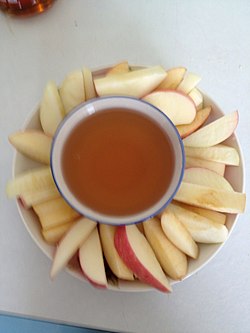
Summary
Apples and honey is a traditional dish served by Ashkenazi Jews on Rosh Hashanah, the Jewish New Year's Day and the beginning of the High Holidays.[1][page needed]
 | |
| Place of origin | Originally Europe, also Jewish diaspora |
|---|---|
| Serving temperature | Room temperature |
| Main ingredients | Apples, honey |
| |
History edit
Ancient Israelites likely did not eat apples and honey, since apples were not cultivated in the Levant at the time.[2] Honey from wild bees is attested in the Bible and archaeologists have discovered an apiary from the 10th century BCE in Israel. However, boiled fruit syrups, such as date honey, were the more common form of honey at the time.[1]
The first known connection between apples and Rosh Hashanah is in the prayer book Machzor Vitry, written in 11th-century CE France.[3] The first known mention of apples and honey being eaten on Rosh Hashanah comes from the 14th-century legal work Arba'ah Turim, which states that German Jews ate apples and honey in order to bring sweetness into the New Year.[4]
Overview edit
Apples and honey consists of raw apples sliced and served with a separate dish of honey. A blessing is said in Hebrew over the apples and honey, to ask for a "Sweet New Year", and the apple is then dipped into the honey and eaten.[1] Dipping apples in honey is a minhag and is not dictated by the Tanakh or the Talmud.[5]
In American-Jewish culture edit
Ahead of Rosh Hashanah in English-speaking Ashkenazic schools, young schoolchildren learn the "dip the apple in the honey" song (to the tune of Oh My Darling, Clementine).[6]
See also edit
References edit
- ^ a b c Marks, Gil. The Encyclopedia of Jewish Food. HMH.
- ^ Alter, Robert (2019). The Hebrew Bible: A Translation with Commentary. Vol. 3. New York, NY: W. W. Norton & Company. p. 591. ISBN 9780393292497.
- ^ Koerner, András (2018). Jewish Cuisine in Hungary: A Cultural History with 83 Authentic Recipes. Budapest, Hungary: Central European University Press. p. 160. ISBN 9789633862735.
- ^ "Tur, Orach Chaim 583:1". Sefaria. Retrieved June 9, 2023.
- ^ "Why Apples and Honey?". ReformJudaism.org. Retrieved 2020-08-29.
- ^ Rabbi Mordechai Kamenetzky in The Chinuch Roundtable, Yated Ne'eman, September 23, 2022, p. 119: Indeed, we all know the song, "Dip the apple in the honey, make a brocha loud and clear, leshanah tovah umesukah, have a happy sweet New Year," that famous children's Rosh Hashanah tune that is sung to the tune of Oh My Darling Clementine.


